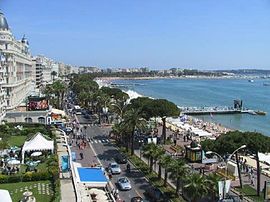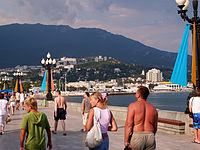by Robert Whitcomb | Aug 12, 2016 | News

A view toward the beaches of Cannes.
Mayor David Lisnard of the famous Riviera resort city of Cannes has banned the wearing of burqinis on its beaches, in an obvious rejection of a Muslim tradition that scares many non-Muslims because of the current link in many minds of Islam and terrorism.
The order says “access to beaches and for swimming is banned to anyone who does not have [bathing apparel] which respects good customs and secularism,” which is a founding principle of the French Republic.
We suspect that he won’t be the last Western mayor to back such an order.
“Beachwear which ostentatiously displays religious affiliation, when France and places of worship are currently the target of terrorist attacks, is liable to create risks of disrupting public order (crowds, scuffles, etc.) which it is necessary to prevent,” the order says.
Cannes, of course, is home to the famous international film festival named after it. The order comes only a few weeks after a Muslim terrorist murdered 85 people in nearby Nice.
Hit this link to read the whole story.
by Robert Whitcomb | Aug 11, 2016 | News
The Washington Post reported on a story that worries Turkey’s NATO allies:
“The leaders of Turkey and Russia pledged on Aug. 9 to restart key energy projects and roll back sanctions, seeking to rebuild ties as Turkey looks beyond its NATO partners for support following a failed coup attempt last month.
“In his first trip abroad since the attempted takeover by the military, Turkish President Recep Tayyip Erdogan openly courted Russia — in vivid contrast to recent and bitter hostilities with Moscow, especially over Syria’s civil war.
“….The Turkish leader repeatedly thanked Putin for his rapid offer of aid following the coup attempt, and called for relations between the two countries to return ‘to their pre-{Syrian} crisis level, or even higher.”’
To read the article, please hit this link.
by Robert Whitcomb | Aug 11, 2016 | News

In the resort of Yalta, in Crimea.
In what mean more Russian military attacks against Ukraine, Russian President Vladimir Putin ordered naval war games in the Black Sea after he accused Ukraine of sending saboteurs into Crimea, which Russia seized from Ukraine in 2014.
Ukrainian and other observers fear that Russia may plan to ramp up fighting in the war between Ukraine and pro-Russian and Russian armed separatists.
Reuters speculated: “Such an escalation could be used by Putin to demand better terms in the Ukraine peace process, or to inflame nationalist passions at home ahead of Russian parliamentary elections next month.”
To read the Reuters story, please hit this link.
by Robert Whitcomb | Aug 11, 2016 | News
The Guardian and Reuters passed on not totally confirmed reports that Vietnam has fortified several islands it controls in the South China Sea with mobile rocket launchers so that it can strike Chinese military bases in the region. This would be one of the most assertive Vietnamese moves in decades and would be in response to China growing militarization in the sea, which it claims control of in violation of international law.
To read the full article on this, please hit this link.
by Robert Whitcomb | Aug 10, 2016 | News
In the sort of mass public protest that is increasingly unusual under Russia’s authoritarian government, hundreds of critics of the Russian government of President Vladimir Putin armed with a rare demonstration gathered in Moscow on Aug. 9 to protest a new set of so-called antiterrorism laws.
The laws include requirements to store all communications data for six months, and phone and texting records for one to three years.
The New York Times reported that protesters “decried the legislation as an assault on privacy and internet freedom. …”
The Times continued: “For just over an hour, speakers at the rally — activists, politicians and technology experts — called on Russians to resist government attempts to tighten control over the internet, which many view as the last safe space for dissent in Russia. For just over an hour, speakers at the rally — activists, politicians and technology experts — called on Russians to resist government attempts to tighten control over the Internet, which many view as the last safe space for dissent in Russia.”
To read The New York Times story, please hit this link.
by Robert Whitcomb | Aug 10, 2016 | News
Rodrigo Duterte, the new president of the Philippines, has called the U.S. ambassador to the country, Philip Goldberg, a ‘’gay son of a whore’’. He made the comments Aug. 5 during an address to Filipino military officials, sparking, of course, a diplomatic row.
To hear and read about his remarks, please hit this link.
by Robert Whitcomb | Aug 9, 2016 | News
Venezuela’s National Electoral Council has ruined hopes for a recall referendum on leftist President Nicolas Maduro this year.
Electoral council chief Tibisay Lucena announced several procedural details that would clearly push the referendum into 2017.
The delay will probably anger Maduro’s foes, who accuse him of ruling like a dictator and ruining the economy.
Opposition leader Henrique Capriles said Aug. 6 that he would call on supporters to march to Caracas on Sept. 1 if the CNE didn’t reverse itself.
To read a longer article, please hit this link.
by Robert Whitcomb | Aug 9, 2016 | News
The leader of Poland’s conservative ruling party, Jaroslaw Kaczynski, met on Aug. 9 with Hungarian Prime Minister Viktor Orban. The meeting of two right-wing and nationalistic leaders raised some concerns in more liberal parts of Europe about the growing right-wing populism in Europe spurred by the Mideast migrant crisis and a sluggish economy.
Mr. Kaczynski holds no official government position but many observers see him as Poland’s most powerful person, guiding both the prime minister and the president.
Mr. Orban’s strong governing style — which he calls “illiberal” —had drawn Mr. Kaczynski’s admiration. The authoritarian tone of both men and their governments’ attacks on news media and some other parts of civil society have raised concerns abroad about the health of democracy in eastern Europe.
To read a New York Times article on this, please hit this link.
by Robert Whitcomb | Aug 9, 2016 | AI World Society Summit
Japanese Foreign Minister Fumio Kishida has warned that ties with China are “significantly deteriorating”after Chinese vessels repeatedly entered disputed waters in the East China Sea. Mr. Kushida had called the Chinese ambassador to Japan to protest what the foreign minister called “incursions”by an increasingly expansionist and militarily aggressive China.
On Aug. 5 about 230 Chinese fishing boats and coast guard vessels went through islands claimed by both countries.
The Japan-controlled, uninhabited islands – known as the Senkaku in Japan and the Diaoyu in China – are the source of a long-running dispute.
To read a longer article on this, please hit this link.

